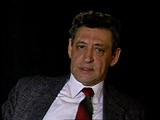<< Previous | Displaying results 26-50 of 571 for "" | Next >>
-
Hans Heimann describes Italian aid to Jews
Oral HistoryThe Germans annexed Austria in March 1938. In 1939, Hans fled first to Hungary and then to Italy. He and his parents were interned in various towns. Hans's father became ill and died in 1940. In 1943, Hans and his mother were warned of German plans to deport Jews from Italy to Poland. They moved to smaller towns until liberation by the British in August 1943. Hans worked as an interpreter for the Allies until 1945, when he worked for the American Jewish Joint Distribution Committee and helped resettle…
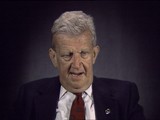
-
Ivo Herzer describes assistance from Italian soldiers during his family's escape from Croatia
Oral HistoryIvo grew up in a middle-class Jewish family in Zagreb. He experienced little overt antisemitism until the Germans and their allies invaded Yugoslavia in April 1941 and installed a fascist Ustasa government in Croatia. The Ustasa regime began killing Jews, Serbs, and Roma (Gypsies). Ivo's family escaped to Italian-occupied territory, where the Italians tried to protect Jewish refugees. Ivo lived in Italian internment camps, including the Rab island camp, before moving to mainland Italy in 1944. He worked…
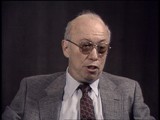
-
Johanna Gerechter Neumann describes her family's arrival in Bologna and aid received from Italian students before emigrating to Albania
Oral HistoryAmid intensifying anti-Jewish measures and the 1938 Kristallnacht ("Night of Broken Glass") pogrom, Johanna's family decided to leave Germany. They obtained visas for Albania, crossed into Italy, and sailed in 1939. They remained in Albania under the Italian occupation and, after Italy surrendered in 1943, under German occupation. The family was liberated after a battle between the Germans and Albanian partisans in December 1944.
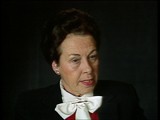
-
Vladka (Fagele) Peltel Meed describes clandestine cultural activities in the Warsaw ghetto
Oral HistoryVladka belonged to the Zukunft youth movement of the Bund (the Jewish Socialist party). She was active in the Warsaw ghetto underground as a member of the Jewish Fighting Organization (ZOB). In December 1942, she was smuggled out to the Aryan, Polish side of Warsaw to try to obtain arms and to find hiding places for children and adults. She became an active courier for the Jewish underground and for Jews in camps, forests, and other ghettos.
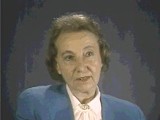
-
Renee Schwalb Fritz describes her experience as a Jewish child hiding in a Catholic convent
Oral HistoryRenee's father left for the United States in 1939. Before Renee and her mother could join him, they had to flee to Belgium to escape the repression of Jews in Austria. The Germans occupied Belgium in 1940. Renee was hidden in a convent for two years, until the Germans became suspicious. The underground took Renee to a Protestant family's farm, and then to an orphanage. After the war she was reunited with her mother, who had survived Auschwitz. Five years later they joined her father in the United States.
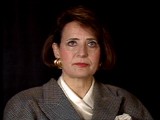
-
Barbara Ledermann Rodbell describes her reaction to Nazi-mandated schools for Jewish children in Amsterdam
Oral HistoryIn 1933 Barbara's family moved to Amsterdam, in the Netherlands. They became friends of Anne Frank and her family. The Germans invaded the Netherlands in 1940. Barbara's boyfriend, Manfred, had underground contacts and she got false papers. Her mother, sister, and father were deported to Westerbork and then to Auschwitz. Barbara survived using her false papers and worked for the resistance. She helped take Jews to hiding places and also hid Jews in an apartment held in her false name.
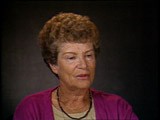
-
Jerry von Halle describes restrictions on Jews in Amsterdam
Oral HistoryIn 1933 Jerry's family moved from Hamburg to Amsterdam. The Germans invaded the Netherlands in 1940. In 1941, Jerry's brother perished in Mauthausen. Jerry and his parents went into hiding first in Amsterdam and then in a farmhouse in the south. The Gestapo (German Secret State Police) arrested Jerry's father in 1942, but Jerry and his mother managed to return to their first hiding place. They were liberated in Amsterdam by Canadian and Jewish Brigade troops.
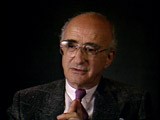
-
Jerry von Halle describes hiding in Amsterdam
Oral HistoryIn 1933 Jerry's family moved from Hamburg to Amsterdam. The Germans invaded the Netherlands in 1940. In 1941, Jerry's brother perished in Mauthausen. Jerry and his parents went into hiding first in Amsterdam and then in a farmhouse in the south. The Gestapo (German Secret State Police) arrested Jerry's father in 1942, but Jerry and his mother managed to return to their first hiding place. They were liberated in Amsterdam by Canadian and Jewish Brigade troops.
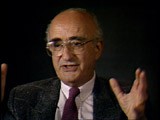
-
Jerry von Halle describes hunger while in hiding in Amsterdam
Oral HistoryIn 1933 Jerry's family moved from Hamburg to Amsterdam. The Germans invaded the Netherlands in 1940. In 1941, Jerry's brother perished in Mauthausen. Jerry and his parents went into hiding first in Amsterdam and then in a farmhouse in the south. The Gestapo (German Secret State Police) arrested Jerry's father in 1942, but Jerry and his mother managed to return to their first hiding place. They were liberated in Amsterdam by Canadian and Jewish Brigade troops.
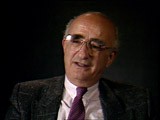
-
Anita Magnus Frank describes hiding in the Netherlands
Oral HistoryWhen the war began, Anita and her family lived in Breda, the Netherlands. With the 1940 German occupation, they went into hiding and took on new names that shielded their Jewish identity. Anita and her brother first were hidden in a non-Jewish neighbor's home, and later by a Quaker family near Utrecht. Anita, her parents, brother, and two sisters survived the war.
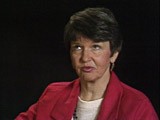
-
Carla Heijmans Lessing describes the fear her family felt while in hiding
Oral HistoryAfter invading the Netherlands in 1940, the Germans imposed anti-Jewish measures. With the aid of a Catholic priest who helped Jews find hiding places, Carla, her mother, and her brother went into hiding in August 1942 to avoid deportation to work camps. They had to leave the hiding place after three months and with the priest's help found shelter in Delft with a Catholic family which had seven children. They remained in hiding there for 30 months, until liberation in May 1945.
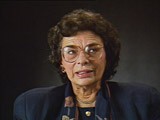
-
Helen (Helene Katz Wohlfarth) Waterford describes giving up her daughter to be sheltered
Oral HistoryAlthough originally from Germany, Helen was living in the Netherlands with her husband and young daughter when the Germans invaded in May 1940. Helen and her husband sent their daughter to non-Jewish friends, and went into hiding themselves. They stayed in a variety of places arranged by a friend who was active in the underground. On August 25, 1944, Helen and her husband were arrested. They were sent first to Westerbork and then to Auschwitz, where they were separated. Helen worked in the I. G. Farben…
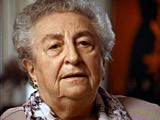
-
Blanka Rothschild describes the beginning of the German invasion of Poland when she and her family were in Lodz
Oral HistoryBlanka was an only child in a close-knit family in Lodz, Poland. Her father died in 1937. After the German invasion of Poland, Blanka and her mother remained in Lodz with Blanka's grandmother, who was unable to travel. Along with other relatives, they were forced into the Lodz ghetto in 1940. There, Blanka worked in a bakery. She and her mother later worked in a hospital in the Lodz ghetto, where they remained until late 1944 when they were deported to the Ravensbrueck camp in Germany. From Ravensbrueck,…
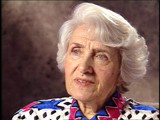
-
Miriam Farcus Ingber describes witnessing a suicide attempt in the Stutthof camp
Oral HistoryMiriam was one of ten children born to a poor, religious Jewish family in Terava, Czechoslovakia. When Hungary took over the area in 1939, almost half the town's Jewish population was deported and sent to labor camps. Later, Miriam and her mother were forced into a ghetto. They were deported to the Auschwitz camp in 1944. After about three months, they were sent to the Stutthof camp. Toward the end of the war, Miriam and her mother were forced on a death march. They and others on the death march were…
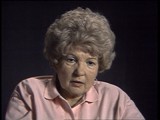
-
Alisa (Lisa) Nussbaum Derman describes joining the Nekama (Revenge) Jewish partisan unit led by Josef Glazman in the Naroch Forest
Oral HistoryLisa was one of three children born to a religious Jewish family. Following the German occupation of her hometown in 1939, Lisa and her family moved first to Augustow and then to Slonim (in Soviet-occupied eastern Poland). German troops captured Slonim in June 1941, during the invasion of the Soviet Union. In Slonim, the Germans established a ghetto which existed from 1941 to 1942. Lisa eventually escaped from Slonim, and went first to Grodno and then to Vilna, where she joined the resistance movement. She…
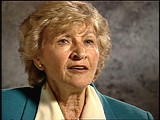
-
Alisa (Lisa) Nussbaum Derman describes partisan activities
Oral HistoryLisa was one of three children born to a religious Jewish family. Following the German occupation of her hometown in 1939, Lisa and her family moved first to Augustow and then to Slonim (in Soviet-occupied eastern Poland). German troops captured Slonim in June 1941, during the invasion of the Soviet Union. In Slonim, the Germans established a ghetto which existed from 1941 to 1942. Lisa eventually escaped from Slonim, and went first to Grodno and then to Vilna, where she joined the resistance movement. She…
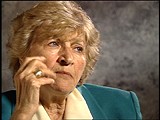
-
Dorotka (Dora) Goldstein Roth describes conditions in the Vilna ghetto
Oral HistoryAfter the Germans invaded Poland in 1939, Dora's family fled to Vilna, Lithuania. When the Germans occupied Vilna, Dora's father was shot and the rest of the family was confined in the Vilna ghetto. Dora, her sister, and her mother were deported to the Kaiserwald camp in Latvia and then to the Stutthof concentration camp near Danzig. Her mother and sister perished in Stutthof. Dora herself was shot immediately before liberation, but she survived.

-
Nesse Galperin Godin describes the formation of the Siauliai ghetto
Oral HistoryNesse's family had a dairy business. The Germans occupied Lithuania in 1941 and established a ghetto in Siauliai. Nesse lived in the ghetto until 1943 when she was old enough to work. In 1944 Nesse, her mother, and a brother were deported to the Stutthof camp near Danzig. Nesse worked in several Stutthof subcamps until January 1945, when the inmates were put on a death march. She was liberated by the Soviets in March. Nesse, her mother, and two brothers survived, and she arrived in the United States in…
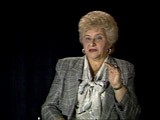
-
Fritzie Weiss Fritzshall describes deportation in cattle car to Auschwitz
Oral HistoryFritzie's father immigrated to the United States, but by the time he could bring his family over, war had begun and Fritzie's mother feared attacks on transatlantic shipping. Fritzie, her mother, and two brothers were eventually sent to Auschwitz. Her mother and brothers died. Fritzie survived by pretending to be older than her age and thus a stronger worker. On a death march from Auschwitz, Fritzie ran into a forest, where she was later liberated.
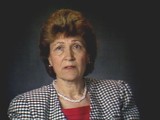
-
Leo Schneiderman describes conditions on a freight car during deportation from Lodz to Auschwitz
Oral HistoryThe Germans invaded Poland in September 1939. Leo and his family were confined to a ghetto in Lodz. Leo was forced to work as a tailor in a uniform factory. The Lodz ghetto was liquidated in 1944, and Leo was deported to Auschwitz. He was then sent to the Gross-Rosen camp system for forced labor. As the Soviet army advanced, the prisoners were transferred to the Ebensee camp in Austria. The Ebensee camp was liberated in 1945.
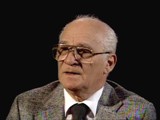
-
Leo Schneiderman describes routine at the Ebensee camp
Oral HistoryThe Germans invaded Poland in September 1939. Leo and his family were confined to a ghetto in Lodz. Leo was forced to work as a tailor in a uniform factory. The Lodz ghetto was liquidated in 1944, and Leo was deported to Auschwitz. He was then sent to the Gross-Rosen camp system for forced labor. As the Soviet army advanced, the prisoners were transferred to the Ebensee camp in Austria. The Ebensee camp was liberated in 1945.
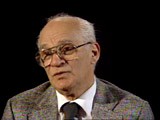
-
Saul Ingber describes forced labor and brutality in the Gusen subcamp of the Mauthausen concentration camp
Oral HistorySaul grew up in a religious Jewish family. He was trained as a tailor. In 1939 he was sent to forced labor along with most of the young men of his town. He worked in many different labor camps before being deported to the Mauthausen concentration camp system in 1944. While working there, Saul's hand was broken by an SS guard. He eventually ended up in the hospital in the Dachau camp. He was liberated by US troops in May 1945. After the war he returned to his hometown and was reunited with his sister. They…
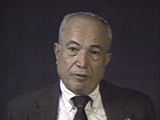
-
Norbert Wollheim describes a roundup of Jews in Berlin
Oral HistoryNorbert studied law and was a social worker in Berlin. He worked on the Kindertransport (Children's Transport) program, arranging to send Jewish children from Europe to Great Britain. His parents, who also lived in Berlin, were deported in December 1942. Norbert, his wife, and their child were deported to Auschwitz in March 1943. He was separated from his wife and child, and sent to the Buna works near Auschwitz III (Monowitz) for forced labor. Norbert survived the Auschwitz camp, and was liberated by US…
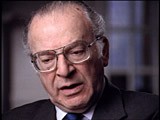
-
Norbert Wollheim describes deportation from Berlin
Oral HistoryNorbert studied law and was a social worker in Berlin. He worked on the Kindertransport (Children's Transport) program, arranging to send Jewish children from Europe to Great Britain. His parents, who also lived in Berlin, were deported in December 1942. Norbert, his wife, and their child were deported to Auschwitz in March 1943. He was separated from his wife and child, and sent to the Buna works near Auschwitz III (Monowitz) for forced labor. Norbert survived the Auschwitz camp, and was liberated by US…
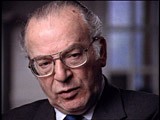
-
Norbert J. Yasharoff describes the trial and sentencing of a Jewish man falsely charged with economic crimes
Oral HistoryAnti-Jewish measures took effect in Bulgaria after the beginning of World War II. In March 1941, Bulgaria joined the Axis alliance and German troops passed through Sofia. In May 1943, Norbert and his family were expelled to Plevin in northern Bulgaria, where they stayed with relatives. After the advance of the Soviet army in 1944, Norbert and his family returned to Sofia.
